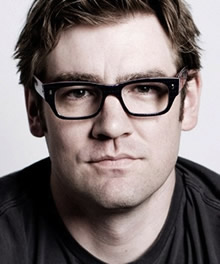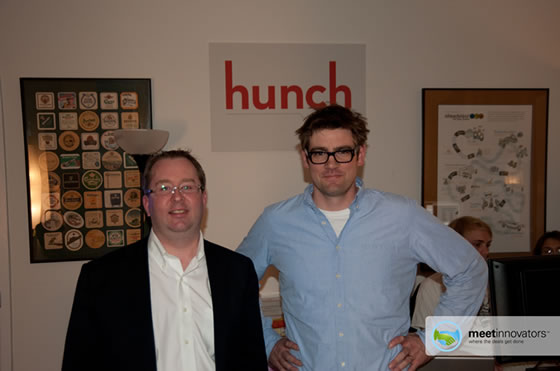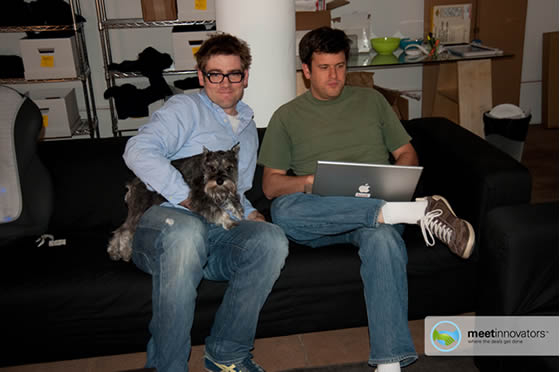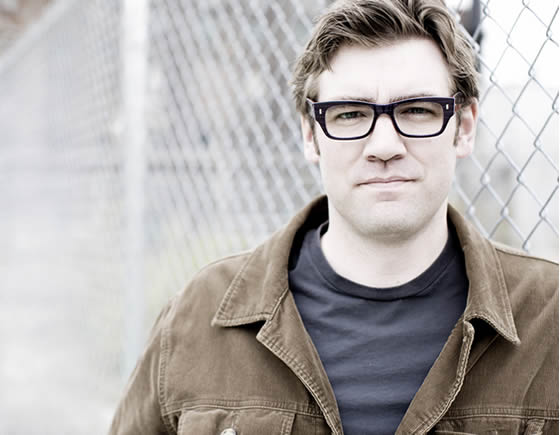
- Learn About Chris’s New Project, Hunch.com, Cofounded With Caterina Fake Of Flickr
- Find Out How Chris Does Angel Investing In The NYC Area
- Read How Chris, Cofounder Of SiteAdvisor.com Sold To McAfee
Full Interview Audio and Transcript
Personal Info
Hobbies and Interests: Reading, Computers, Exercise.
Sports teams: Doesn’t really watch sports.
Favourite Books: Anything in philosophy, science and history.
Favourite Entrepreneurs: Steve Jobs.
Twitter url: http://twitter.com/cdixon
Personal blog: http://cdixon.org
Company website: http://www.hunch.com
Fast Track Interview
Adrian Bye: I’m with Chris Dixon in his offices at Hunch. He is the co-founder of Hunch and is called the new Fred Wilson, who is the top VC in New York City. Chris has been writing some really good blog posts on investing and how it works. Chris, thanks for taking time for the interview. Can you start by telling us a little bit about yourself?
 Chris Dixon: I grew up in Ohio and moved to New York to go to college. I immediately fell in love with the vibrancy and all the interesting things happening in the city. I’ve been in New York now for about 15 years.
Chris Dixon: I grew up in Ohio and moved to New York to go to college. I immediately fell in love with the vibrancy and all the interesting things happening in the city. I’ve been in New York now for about 15 years.
I was a computer programmer and to support myself for a number of years after college I worked at a high-tech hedge fund. I also worked for two years in venture capital at Bessemer Venture Partners. It gave me an interesting perspective of seeing the VC world from the inside.
Around 2004, I left there to start a company. If you remember, it was pre-Firefox and spyware and phishing were at their peak. When you were on the web, you were going to Internet Explorer and ActiveX popups and spyware were everywhere.
My idea was to start a company that tried to solve these problems by creating a reputation system for the web that said, "These are the good websites and these are the bad websites." The idea was that a lot of regular internet users’ problems were because they just didn’t know whether they were dealing with a reputable website.
That business was later acquired by McAfee. We raised money from VCs, and they did very well with approximately 10 times their money. I then had a 15-month lockup at McAfee. While I was there, I became interested in helping my friends with their startups and then in angel investing. I’ve invested in about 15 companies since then.
Adrian Bye: Did you know a lot about finance before you started doing that?
 Chris Dixon: I knew finance in that I had worked at hedge fund, raised money as a startup and invested in startups. Actually I try to pretend that I didn’t, but I went to Harvard Business School so I have the MBA and know something of finance.
Chris Dixon: I knew finance in that I had worked at hedge fund, raised money as a startup and invested in startups. Actually I try to pretend that I didn’t, but I went to Harvard Business School so I have the MBA and know something of finance.
Actually the people I’ve been co-investing with decided to formalize what we’ve been doing and started an actual seed fund. It’s really doing what we’ve already been doing, which is true seed investing. The fund is $40 million, which by VC standards is very small.
At this early stage, our sole focus is putting in small amounts of money like a couple of hundred thousand dollars. That’s our actual business as opposed to something I blog about where a lot of big VCs have a $400 million fund and may put $100,000 into a company. There’s just almost no way that $100,000 is meaningful to them.
What they’re really doing is getting their foot in the door to do the next round. What we’re doing is actually investing and caring about that first round. It’s far better for the entrepreneur because our interests are aligned with their interests. For example, we want to get them a higher valuation in the next round whereas a VC will put in the bulk of their money in the next round and therefore doesn’t actually want to see that happen.
There’re all sorts of weird incentives that happen when you have these giant funds. If you read about the VC world, a couple of things happened that have caused the VC industry to be in a pretty bad situation.
The first thing that happened is what’s called the Yale Model. Basically David Swensen, who was the fund manager at Yale 20 years ago, pioneered the idea of putting a lot of the university endowments into highly illiquid securities, namely venture capital, private equity, real estate or the so-called alternate investments.
The idea was that because a college endowment takes a 10-year horizon they have "patient capital." They had outstanding results with 20-something percent returns year over year. Harvard did that, and then suddenly every other university copied it. Pension funds copied it. Everyone decided in the ‘80s and ‘90s that they’d put 5 or 10 percent of their money into venture capital.
What that means is you have things like CalPERS, which the California Retirement Fund, with hundreds and billions of dollars. If they suddenly decide to put $75 billion to $50 billion or 5 percent into a venture, you have $50 billion going to a venture. It creates this massive inflow. Combine that with the dot-com bubble where people made a lot of money in venture, you have this massive influx and tons of VC firms were created.
Meanwhile, you have this opposite trend where it can cost less and less to start an internet company. You have this real mismatch between these billion dollar VC funds that are structured around the world where you need to build heavy hardware and these very capital deficient internet companies.
A bunch of people now have new models that they’re experimenting, and everyone’s doing it a little bit differently. We’re following on that trend with our own variation where we have a fund but everyone involved is an entrepreneur. Part of the theory behind it is that practicing entrepreneurs are better positioned many times to understand and lead investments in areas they understand versus somebody whose background is in banking.
Adrian Bye: Are you actually running this fund?
Chris Dixon: No. It’s the new startup of two friends of mine, who’re serial entrepreneurs, so they’re going full-time. I’m involved on the side.
Adrian Bye: Can you tell us about Hunch?
Chris Dixon: Yes, absolutely. Literally the day after we were done with McAfee, Tom Pinckney, who was my cofounder/ advisor at SiteAdvisor, two of our key technical guys and I rented an office in a temporary space and said, "We want to build stuff."
Since we had an interest in consumer internet and because of our technology orientation, we inevitably were drawn to things around search. We had this particular idea of "Wouldn’t it be neat to build a system that was modeled after how you interact with real human experts."
 An example I often use is if I’m a high school student and go to a college guidance counselor and say, "I want to go to college." A good guidance counselor is going to ask me a series of questions. What do you want to study? What part of the country do you want to live in? What’s your Grade Point Average? Those questions will be conditions on how you answer the prior questions. Finally, they’ll give you a set of recommendations based on your answers.
An example I often use is if I’m a high school student and go to a college guidance counselor and say, "I want to go to college." A good guidance counselor is going to ask me a series of questions. What do you want to study? What part of the country do you want to live in? What’s your Grade Point Average? Those questions will be conditions on how you answer the prior questions. Finally, they’ll give you a set of recommendations based on your answers.
In some cases, they’ll tend to make tradeoffs because they can’t find a single university that satisfies all of your answers. We said, "We should build a system like that because that’s how real human experts do it." And everything on Hunch for the answer is user-generated.
Adrian Bye: What about your business model?
Chris Dixon: About half of our topics are things like "What camera should I buy?" These are product-related. At the end of those topics, there are sponsored links. We get a percentage of what’s clicked on. It’s very similar to Google.
One of things is that we manage to do Hunch in a way that sponsored links are very natural. It’s like search. It’s like somebody’s coming to you and saying, "Help me find a camera." It’s very inoffensive to have a sponsored link if you’d like this camera and care to buy it. We have good merchants, and it’s a good user experience.
Adrian Bye: Are the links generating revenue now?
Chris Dixon: Yes, they are.
Adrian Bye: I want to talk about a post Caterina Fake, who is the co-founder of Flickr and Hunch, made that entrepreneurs shouldn’t work themselves to death. I’m interested in your comments on that and how it fits into angel investing, blog posting and what you’re doing here because it does seem like you’re doing a lot of stuff at the same time.
Chris Dixon: I love doing this stuff. A lot of friends of mine watch sports. For me, talking about startups is like sports. On the weekends, I’ll talk with my friends and say, "Do you see that startup? We should invest in this." This is like a hobby. I don’t really think of it as work, and I probably work a lot of hours as I work pretty hard.
Caterina’s point was actually triggered by a conversation she and I were having about your first startup and this mentality that "If I don’t stay up until 4:00 A.M. every morning pulling my hair out, I’m not doing a good job for the company." She works around 60 hours a week and she’s just saying, "Don’t work 120 hour weeks."
Over time you realise you have to work smarter. You also learn what you’re good at, what you aren’t, and how to hire people that are better than you are at those things. You realise that freaking out all the time is quite counterproductive.
For example at my last startup, I was the product manager. At this current startup, I’ve hired people. I joined up with Caterina who’s a much better product manager than I am. And I instead focus on the things I’m good at: raising money for the company, working on the business model, working on the technical side, being a liaison with the engineering group, and recruiting and keeping people.
Adrian Bye: How do you manage your time between everything?
Chris Dixon: I come into the office full-time. I meet with people throughout the day. A lot of being in this startup world is meeting interesting people. For example, a company will come to me. If I think it’s interesting, I’ll pass it off to the two people I’ve partnered with, and they’ll take care of due diligence, legal documents and all that. If they’re looking to hire a new engineer, I might know an engineer because I spend all my time meeting people like that. That’s kind of where I’m helpful as a connector.
I also meet with VCs. Part of that is because at some point I’m going to raise another round of financing for Hunch but also it’s partly because of the startups I invested in and also just to chat. This is a very small world and everyone chats with each other all the time. With the exception of a few blogs like Fred’s, there’s very little that goes on in this world that’s written down, so you need to talk to people all the time if you want to stay up-to-date on what’s happening.
Adrian Bye: You actually learn more about what’s going than the rest of us?
 Chris Dixon: You learn a lot of important things talking to people. For example, you learn all of the deals happening in New York right now, what stages they’re in and what the valuations are. It’s important to me because I have my own investments. By knowing what else is going on, you can help your own investments strategically.
Chris Dixon: You learn a lot of important things talking to people. For example, you learn all of the deals happening in New York right now, what stages they’re in and what the valuations are. It’s important to me because I have my own investments. By knowing what else is going on, you can help your own investments strategically.
For example, here’s what companies are at your stage with valuations and terms they’re seeing. All this stuff you can only learn through the chatter. No one is publishing this. Fred is incredibly open about everything he does publish but he doesn’t ever publish evaluations. It’s like a grapevine.
Adrian Bye: Silicon Valley is quite a bit in front of New York in terms of the community and what’s going on. What do you think needs to happen here in New York to catch up or to be stronger?
Chris Dixon: The first thing that had to happen did happen, which is the financial bubble collapsed. That was a giant suck of talent on the East Coast. Five years ago, I would go speak to top computer science students at MIT and try to recruit them. I literally saw situations where you’d offer a guy $80,000 a year, and he’d get an offer for $500,000 a year from a hedge fund. This led to an environment where the only people we could really recruit were eccentrics who just didn’t care about the money.
The pendulum is probably going too far back the other way now, which is all these bankers having startups. That’s probably a bad thing. But the good thing is the East Coast is still dominant in terms of great universities, for example, and that’s often the source of lots of startup talent.
For the last 10 years, it’s been perceived you’re crazy if you don’t move west. It’s to the extent that if we can build enough of an ecosystem and have enough critical mass, it’ll start to be that the next Mark Zuckerberg doesn’t feel like he has to move to California.
The other thing is that besides being the centre of capitalism, New York City is the centre of media and advertising, which more and more technology, media, and advertising are converging. In the ‘90s, the internet was a lot about optical switching and infrastructure; that’s now built and working. Now it’s much more about what is required if you’re running advertising.
Naturally, you think it’s all going to play to New York’s strengths. New York is like Silicon Valley in that it’s very immigrant-friendly. It’s very diverse. People like to move here and start things. I bet you if there’s some really big startups here, some of them will be through people who just moved here.
In New York City, you have the people that grew up in Manhattan, the commuters and the people that come here because they live off the energy of it. They love it, and they want to sort of make their mark here. If those people now shift away from finance, traditional media and advertising and heavily involve technology, the tech companies you’ll see here will probably be different. They’ll be more Huffington Post than Twitter. It will have more of a media component. My sense is that all the pieces are in place for kind of a real boom here.
Adrian Bye: What’s next from you? Are you still going to do Hunch?
Chris Dixon: Yes. I love to do Hunch, and I’d like to build a big successful company. I’m very happy doing this and investing on the side. I really like the people I work with and the lifestyle of working on a startup, and I’m going to continue doing that.









